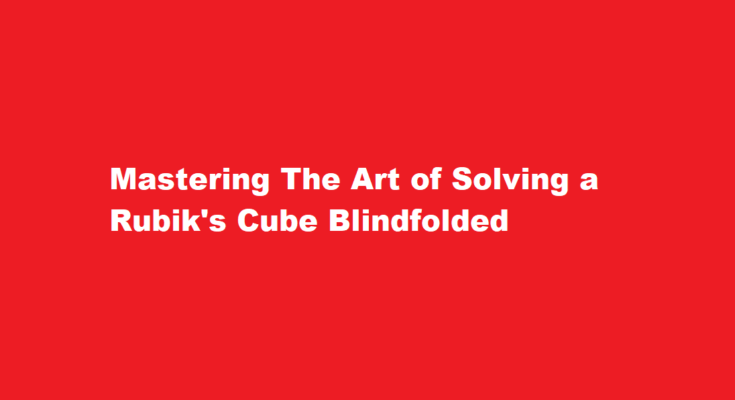Introduction
The Rubik’s Cube, invented by Ernő Rubik in 1974, is a timeless puzzle that has captured the imagination of millions worldwide. While solving it traditionally can be challenging enough, there is a subset of cube enthusiasts who take it a step further by solving it blindfolded. Solving a Rubik’s Cube without seeing it may seem like a daunting task, but with the right techniques and practice, it becomes an achievable feat. In this article, we will explore the step-by-step process of solving a Rubik’s Cube blindfolded.
Understanding the Basics
Before diving into solving a Rubik’s Cube blindfolded, one must have a firm grasp of solving it visually. The blindfolded method builds upon the principles of the traditional solving process. To get started, you will need a standard 3×3 Rubik’s Cube, a blindfold or opaque material, and a timer.
Familiarize Yourself with Notation
Understanding cube notation is crucial. The cube is divided into layers and sides, each represented by a letter (U for Up, D for Down, L for Left, R for Right, F for Front, and B for Back). Movements are denoted by these letters, along with modifiers like ‘2’ for a 180-degree turn and ‘ (apostrophe) for a counterclockwise turn. This notation helps you record and remember your moves during the solve.
Master the Beginner’s Method
If you’re not already comfortable solving a Rubik’s Cube using the beginner’s method, start there. This method simplifies the solving process and allows you to familiarize yourself with the cube’s mechanics. Practice until you can consistently solve the cube visually without too much difficulty.
The Blindfolded Approach
Now that you have a solid foundation in cube-solving, it’s time to embark on the blindfolded journey.
Memorization
The first step to solving a Rubik’s Cube blindfolded is to memorize the initial cube state. You can’t see the cube during the solve, so you must commit its current state to memory. Many blindfolded solvers use a memorization technique called the “Visual-Cube” method. In this method, you mentally associate each sticker on the cube with a specific location and color.
Start by examining the cube and creating a mental map of its current state. Visualize the cube in your mind, layer by layer, making note of the colors on each sticker. Develop a systematic approach to memorize the entire cube, usually starting from one side and working your way around. This process may take some time to master, but practice is key.
Blindfold Yourself
Once you’ve memorized the cube’s initial state, it’s time to blindfold yourself. Use a blindfold or an opaque material that completely obscures your vision. Some blindfolded solvers use blindfolds specially designed for cubing, which allow for comfortable and secure blindfolding.
Execution
With the cube memorized and your vision blocked, it’s time to execute the solve. Follow these steps
- Use your fingers to manipulate the cube based on the memorized moves. Execute each move accurately, focusing on the notation you’ve learned. Take your time; precision is more critical than speed at this stage.
- As you execute each move, maintain a mental image of the cube’s new state. Keep track of where each sticker moves during the solve.
- After completing the moves, pause and visualize the cube’s new configuration. Verify that it matches your mental image of the solved cube.
- Repeat this process for each step of the solve, just as you would in the visual solving method. Keep a steady pace, and don’t rush.
Practice and Patience
Solving a Rubik’s Cube blindfolded is a skill that requires dedication and practice. Start with simple algorithms and gradually work your way up to more complex ones. Consistent practice is the key to improving your blindfolded solving skills.
FREQUENTLY ASKED QUESTIONS
What is the fastest method to solve a Rubik’s cube blindfolded?
A good way to start is to learn the first letter for each face of the cube like a bookmark – A, E, I, M, Q, U. This way when you are looking for the T sticker, you can jump to Q and go around clockwise to find T. The key trick to blindfolded solving is the buffer concept.
What are the 3×3 fewest moves?
Fewest Moves (or Fewest Moves Challenge, FMC) is an event where competitors attempt to solve a puzzle (almost always the 3x3x3) in as few moves as possible, starting from a given scramble.
Conclusion
Solving a Rubik’s Cube blindfolded is a remarkable feat that combines memory, spatial reasoning, and dexterity. While it may seem daunting, anyone with dedication and practice can achieve it. Remember to start with a solid foundation in visual cube-solving, master the memorization techniques, and gradually work your way up to executing the solve blindfolded. With time and patience, you’ll find yourself achieving this impressive feat and adding a new dimension to your Rubik’s Cube-solving skills. So, grab your cube, your blindfold, and embark on the exciting journey of solving a Rubik’s Cube blindfolded.
Read Also : Cracking The Enigma of Mathematics Solving The Riemann Hypothesis



